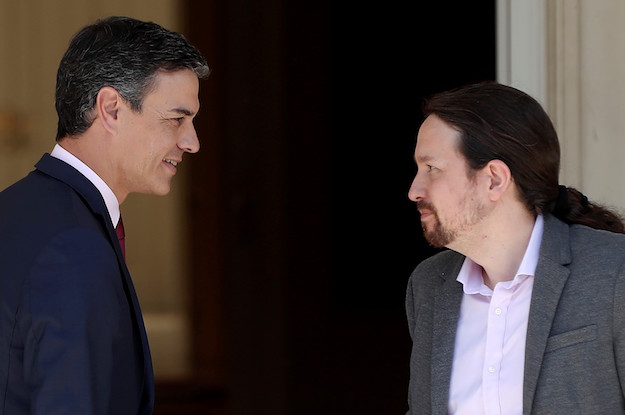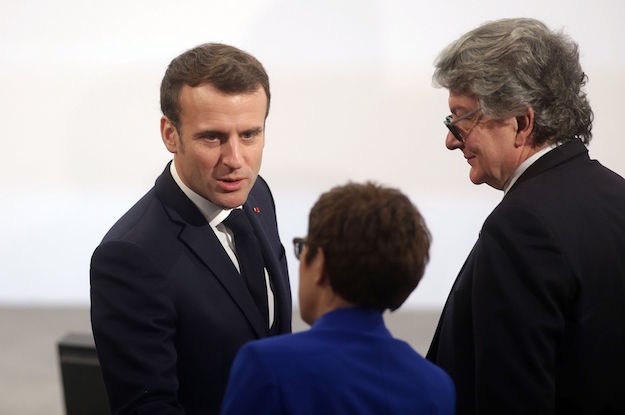VALLADOLID, Spain – Over the past two weeks, Spain has become an accidental protagonist in the diplomatic efforts to end Venezuela’s crises.
The country was recently in the spotlight when opposition leader Leopoldo López sought refuge as a “guest” in the Spanish Embassy in Caracas after calls for a military uprising failed on April 30. López, whose father is a Spanish citizen and a candidate for European Parliament, will likely reside at the embassy for the foreseeable future.
Further, on May 8 the acting Spanish foreign minister sparred with Donald Trump’s Special Representative for Venezuela, Elliott Abrams, accusing the United States of acting “like a western cowboy.” Days later, Spanish law enforcement arrested a former Venezuelan electric power development minister on a U.S. warrant, the second such detention in a month.
The good news is that Spain is well-positioned to lead the effort to restore democracy in Venezuela. The bad news is that the Spanish government, led by the center-left Socialist Party, is deeply conflicted about what to do – potentially missing an opportunity to offer clear, consistent and vocal leadership that would stand in contrast to the Trump administration’s “cowboy” approach.
Since Socialist Party leader Pedro Sánchez assumed Spain’s premiership last June, the result has been a halting and sometimes belated approach to Venezuela. After Venezuela’s National Assembly declared Juan Guaidó interim president in January, Sánchez waited almost two weeks to recognize him. More recently, the Spanish foreign ministry clarified that López has not requested asylum and that he will not be allowed to turn the embassy into a “center of political activism.”
This reluctance by the Spanish left – particularly its most ideological factions – to wade into the Venezuelan crisis mirrors other left-wing parties across Europe who once supported Hugo Chávez and remain suspicious of U.S. interventionism. British opposition leader Jeremy Corbyn has taken a generally equivocating position on the crisis, while Jean-Luc Mélenchon, the leader of the French far-left, continues to support Maduro against alleged “coup plotters.”
Additionally, Venezuela does not seem to be a concern for the Spanish electorate. The run up to elections in April was dominated by talk of corruption, the economic crisis and Catalonia; Venezuela did not come up in the debates, and was only briefly mentioned in the electoral programs of the center-right. With local, regional and European elections scheduled for May 26, Venezuela continues to be mostly absent from the campaign.
But there are five clear ways that Spain can demonstrate that the democratic cause in Venezuela is not just a guise for U.S. adventurism:
First, the Spanish political class should stop using the Venezuelan crisis as a purity test of right versus left (or left versus far-left). This is particularly important in the next few weeks as the two parties likely to form Spain’s next government, the center-left Socialist Party and the leftist Unidas Podemos, negotiate a coalition. While Sánchez has recognized Guadió as interim president, Pablo Iglesias, leader of Unidas Podemos, called that “a mistake” and condemned what he sees as an attempted coup d’etat. Spain must move beyond domestic political divides and forge a unified front to push for a peaceful democratic transition.
Second, Spain could play a more active role in the migration crisis. Last year, Venezuelans led other nationalities in asylum applications in Spain, which grew nearly 10 times between 2014 and 2018. Still, in 2018, Spain formally granted asylum to only 30 Venezuelan asylum seekers and denied 1,495. The government could increase the resources dedicated to processing these requests and expand alternative forms of legal stay. It has taken the right first step with the creation of a humanitarian temporary residence permit for those Venezuelans who are denied asylum. However, it should also consider sustainable longer-term solutions, as the Venezuelan exodus will likely be long-lasting.
Third, Spain is uniquely positioned to continue pressuring Maduro’s inner circle. Spain still has considerable economic ties with Venezuela and has clashed with the Trump administration over sanctions, especially on Venezuelan oil. While the exact extent is unknown, it is also widely believed that many Venezuelan political and military leaders have family and valuable assets in Spain. Sanctions could be applied against them through visa bans and asset freezes. The first step, however, is amending a 2013 law that attempted to attract foreign capital in the midst of the financial crisis with strict asset protections. At the same time, the U.S. government also thinks that Spain could be the perfect place for chavista defectors to go into comfortable exile as part of a negotiated transition, as Abrams argued in his recent trip to the country.
Fourth, Spain can and should lead in coordinating the messy coalition of European and Latin American countries, particularly on the spaces in which it is influential – the European Union and its International Contact Group. Already the European politics on Venezuela are fractious. An indecisive Spain, despite Sánchez’s government claims to be “leading,” could undermine the effectiveness of European engagement. The growing danger of fragmentation between the countries that support Guaidó must be avoided. More active diplomacy could also help prevent future public spats and counter the Trump administration’s aggressive rhetoric.
Finally, Spanish and European diplomacy can lead the long-term planning around the crisis, which has no clear end in sight. Spain is right to call for elections, but much must change before free and fair voting can be held in Venezuela, starting with a census, a new electoral agency and other basic institutional rebuilding measures. In the nearer term, Spain can help lead formal and informal negotiations with various aspects of the chavista government. So long as Maduro is in power, transition planning will be more imagination than anything else.
To be clear, there are principled reasons behind Spain’s objections to the Trump administration’s approach, and the Sánchez government is right to insist forcefully that military intervention is not and should not be on the table. But Spain, as has been the case with most other countries supporting Guaidó, has been mostly reactive, whether to the latest developments on the ground or to the Trump administration’s bravado.
In short, Spain must show that the Trump administration is not the only one capable of speaking up in the international community. For now though, the Spanish foreign minister is right that the cowboys are running the conversation on Venezuela. But they will continue do so until an alternative is presented.
—
González is a program strategy and communications associate in the office of the president at the Inter-American Dialogue. Born in Spain, she previously worked at El País and the National Democratic Institute. Raderstorf is a graduate student at the University of California, Berkeley, and a non-resident fellow at the Inter-American Dialogue.








